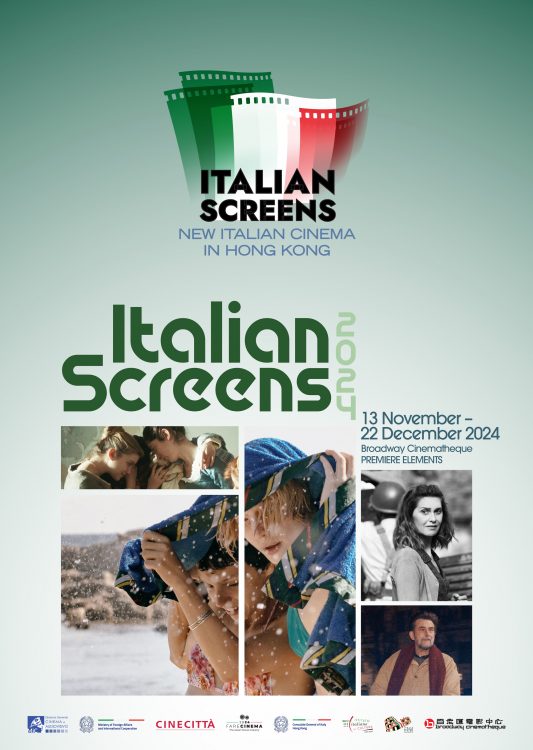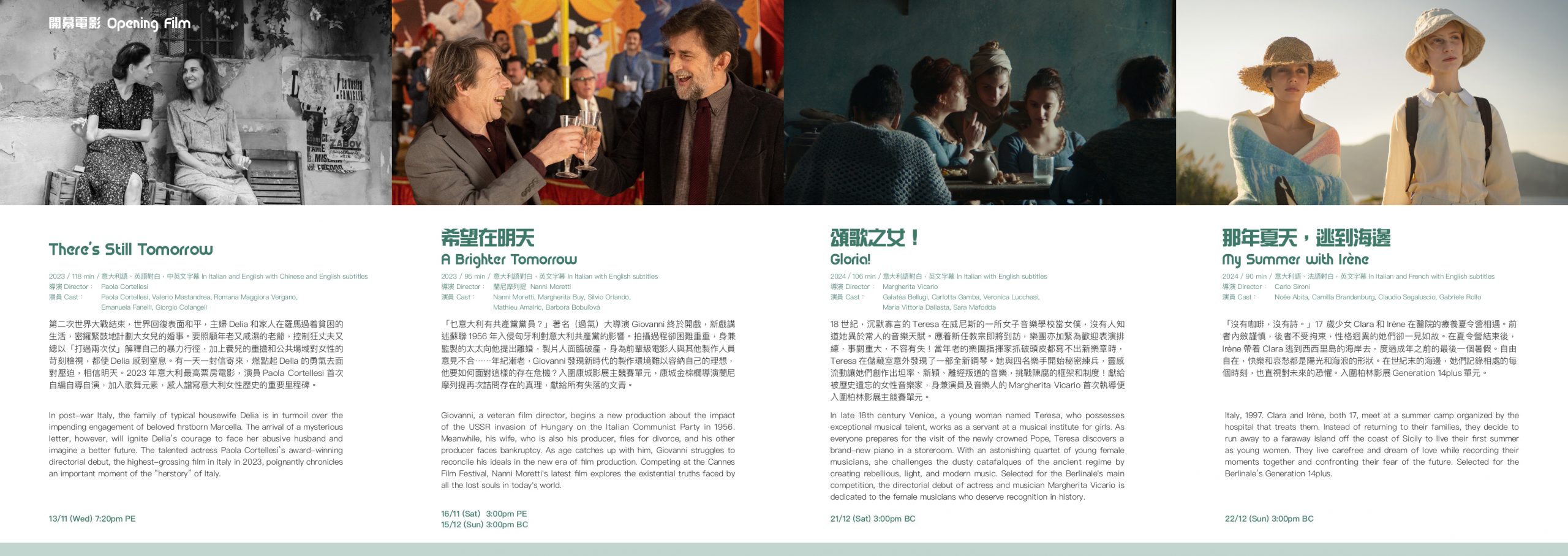13 November – 22 December 2024
HONG KONG

The Consulate General of Italy and the Italian Cultural Institute in Hong Kong are delighted to present the 2nd edition in Hong Kong of ITALIAN SCREENS – New Italian Cinema Goes Abroad, in collaboration with Broadway Cinematheque, and with the support of the Italian Ministry of Foreign Affairs and Cinecittà for the Directorate General for Cinema and Audiovisual of the Italian Ministry of Culture.
Between 13 November and 22 December, a selection of the best of Italian contemporary film productions will be screened for the first time in Hong Kong. The four films capture the essence, beauty, and diversity of Italian contemporary storytelling, with particular attention to emerging talents. ITALIAN SCREENS presents a variety of stories, unforgettable characters and stunning landscapes for a deep look into current themes, exploring the challenges and human experiences through unique and gripping narratives.

The Film Festival is also part of the Autumn Festival “ITALIA on Stage”, organized by the Consulate General of Italy and the Italian Cultural Institute, in partnership with all the Italian institutions and associations in town, that celebrates the best of Italian culture, business, art and lifestyle in Hong Kong
The critically acclaimed opening film, There’s Still Tomorrow, which has surpassed Barbie and Oppenheimer as the highest-grossing movie of 2023 in Italy, is a must-see for cinephiles. The film focuses on the lives of grassroots women in Rome as they reclaim their dignity and pride amidst financial pressure and domestic abuse. Using the characters’ individual experiences, actress Paola Cortellesi paints a picture reflective of the broader community. Taking on screenwriting, directorial, and acting responsibilities for the first time, she gracefully depicts an important chapter of Italian feminist history with elements of song and dance.
Gloria! transports the audience back to the 18th century, where a bashful servant full of musical talent encounters a quartet of equally talented and ambitious musicians. An exchange of inspirations leads them to create rebellious, light, and modern music that challenges the dusty catafalques of the ancient regime! What shock do they bring to the totems of power, such as churches and priests? By reframing the sounds and tunes of female musicians in a rewriting of musical history, actress and musician Margherita Vicario’s directorial debut has been selected for the Berlinale’s main competition.
My Summer with Irène witnesses the encounter of two teens, both hospitalised, who bond despite their polar personalities. At the end of summer camp, they escape to a faraway island off the coast of Sicily to live their last summer before adulthood. However, the glimmers of beach and sunshine fail to ease their troubles. Their fates remain unknown as they detail every moment at the seaside before the turn of the century, directly confronting their fears of the future. Directed by Carlo Sironi and selected for the Berlin International Film Festival’s Generation 14plus, this film captures the Y2K-esque perplexity and anguish.
Palme d’Or-winning director Nanni Moretti directs, writes, and stars in A Brighter Tomorrow, which is selected for the main competition at the Cannes Film Festival. Posing questions about existential truth, Moretti shares with the audience how, instead of being alleviated, the troubles of life are magnified with the passing of age. When veteran film director Giovanni begins a new production, it proves to be anything but easy. Faced with a divorce and his producer’s bankruptcy, the experienced filmmaker struggles to agree with his younger production staff. As age catches up with him, Giovanni finds it increasingly difficult to reconcile his ideals within the new era of film production. How is he to cope with this existential crisis?
